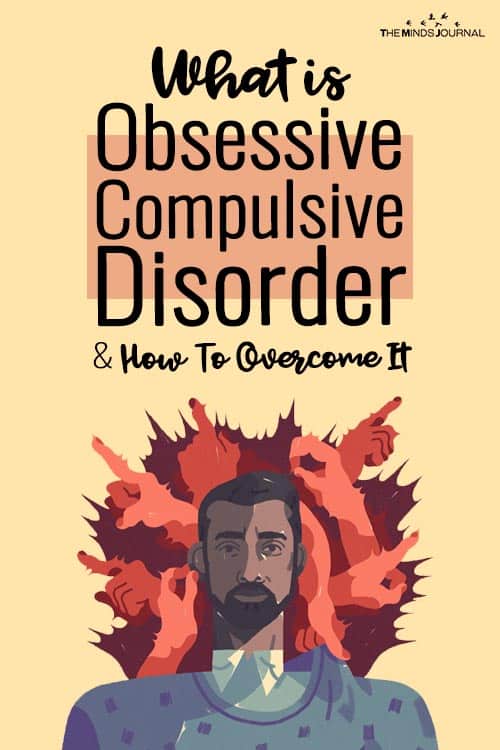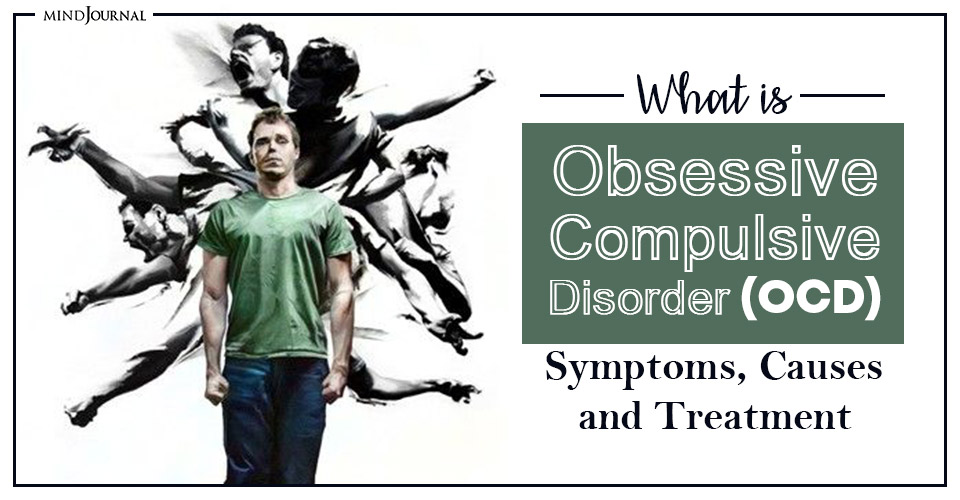Are obsessive thoughts and compulsive behaviors affecting your life? Obsessive compulsive disorder or OCD is a common mental disorder characterized by intrusive, obsessive thoughts and repetitive, compulsive actions.
Whether you’re a man, woman, or child, OCD can affect anyone. This mental health condition can cause serious difficulty in your life, but effective treatment can help you significantly.
What Is Obsessive Compulsive Disorder (OCD)?
Obsessive compulsive disorder, also known as obsessive compulsive neurosis, is a mental illness that involves unwanted, intrusive, and sometimes disturbing thoughts, urges, or fears (obsessions) that causes a lot of discomfort and anxiety.
As a result, the person tries to control the thoughts and urges and reduce their anxiety by engaging in repetitive mental acts or behaviors (compulsions). Such obsessions and compulsions can greatly interfere with a person’s ability to properly function and carry out daily activities.
The American Psychiatric Association (APA) defines OCD as an anxiety disorder where “people have recurring, unwanted thoughts, ideas or sensations (obsessions) that make them feel driven to do something repetitively (compulsions). The repetitive behaviors, such as hand washing, checking on things or cleaning, can significantly interfere with a person’s daily activities and social interactions.”
According to the National Institute of Mental Health (NIMH), obsessive-compulsive disorder “is a common, chronic, and long-lasting disorder in which a person has uncontrollable, reoccurring thoughts (obsessions) and/or behaviors (compulsions) that he or she feels the urge to repeat over and over.”
Related: 5 Signs You Might Have OCD
The Vicious Cycle Of OCD
With OCD, your obsessive thoughts and compulsive behaviors will become extremely consuming and uncontrollable. You will feel compelled to do something even when you realize that these obsessions and compulsions are irrational and unnecessary. However, you will be unable to stop, resist or break free from them.
Obsessive-compulsive disorder is unlike common bad habits, such as biting fingernails or having negative thoughts. An obsessive may make you feel compelled to think that a specific number is lucky or unlucky for you. A compulsion may force you to wash your hands or face repeatedly, especially after touching something or going outside. You may feel reluctant to do such things or try to ignore the triggers, but you will feel helpless and that will add to your anxiety.
These thoughts and behaviors will get stuck in your mind and you will be unable to shake off these urges despite how hard you try or engage in them. Although performing these intrusive and repetitive actions will provide you some short-term relief from the anxiety, you will be unable to enjoy them or obtain any pleasure from them. Whether you try to ignore them or indulge in them, the thoughts and urges will keep coming back to haunt you. This is the vicious trap of obsessive-compulsive disorder.
Fast Facts About OCD
Here are some quick, yet important OCD facts and statistics that you need to know about to better understand this condition:
1. According to the American Psychiatric Association (APA), around 1.2% of U.S. citizens are affected by OCD.
2. Obsessive compulsive disorder can also occur among children, adolescents and teenagers.
3. Studies have found that “Gender is a relevant factor” when evaluating OCD. It was also found that adult women are slightly more affected than adult men in the U.S.
4. Approximately, 1 in 100 American children and around 1 in 40 American adults suffer from OCD.
5. One study highlighted a reported case of OCD symptoms in a 4-year-oldgirl who was diagnosed with the condition. The study found that symptoms can appear “sometimes as early as 2 years.”
6. The average age of OCD has been observed to be 19 years. However, in 25% of cases symptoms were seen by the age of 14.
7. Around 30% of victims first experience obsessive compulsive disorder during childhood.
8. Another study revealed that childhood-onset OCD affects approximately 1-2% of children & adolescents.
9. A 1998 study by the NIMH found that among children and teenagers, boys are more likely to have this disorder before puberty as compared to girls.
10. In children, boys have a higher chance of having a family member with OCD than girls.
11. According to the World Health Organization (WHO), “OCD ranks tenth in the World Bank’s and WHO’s ten leading causes of disability and, in the case of women aged 15-44 years, OCD occupies the fifth position.”
12. One study found that over 33% of individuals with OCD reported experiencing occupational disability. Moreover, about 38% of the subjects said they were “unable to work due to psychopathology.”
13. According to the Anxiety and Depression Association of America (ADAA), OCD is found equally in men and women.
14. Children with obsessive compulsive disorder can be effectively treated with therapy and medication with 60-70% children showing signs of significant improvement.
15. Therapy, along with medication is considered to be the most efficient treatment method for OCD
16. 40-60% of people with OCD respond well to SSRI drugs & medication and they experience a 40-50% decrease in symptoms
Symptoms Of Obsessive Compulsive Disorder
Most people feel obsessed and compelled to engage in their thoughts and habits even when they realize that these are illogical and irrational. To have a better understanding of this mental condition, we need to take a closer look at the 2 major aspects of this disorder:
- Obsessions
- Compulsions
Although OCD includes both the above aspects, it is possible for someone to have the symptoms of either obsession or compulsion.
1. Symptoms of obsessions
According to the American Psychological Association (APA), obsessions refer to persistent & recurrent impulses and thoughts that result in discomfort, disgust, stress, and anxiety. Although the individual may be aware that such impulses or thoughts are unreasonable and exist only in their minds, yet they cannot be controlled by reason or logic.
Here are some common symptoms of obsessions:
- Fear of contamination
- Fear of losing control
- Fear of losing things
- Fear of aggression towards self or others
- Aggressive thoughts & violent images in mind
- Worried about something terrible happening
- Concern about exactness or perfectionism
- Unwanted perverse sexual impulses or thoughts or images
- Excessive concern with blasphemy, religion or morality
- Excessive focus on superstitious ideas or luck
- Putting things in perfect order or in symmetry
- Avoiding trigger situations like shaking hands
Related: What Level Is Your OCD?
2. Symptoms of compulsions
Compulsions refer to repetitive and intrusive mental acts or behavior that an individual feels obsessed to perform or complete, as per the APA. Compulsions are usually an attempt at reducing or avoiding anguish or a dreaded situation. Although performing the compulsion may lead to temporary relief from worry and anxiety, the cycle of obsessions return and repeat.
Here are some common types and symptoms of compulsions:
- Excessive cleaning of objects, washing hands, bathing, grooming etc
- Repeatedly checking if things are done properly, like the door is locked
- Constantly checking if anything harmful has happened to self or others
- Repeating routine, daily activities or body movements
- Doing a task multiple times
- Compulsively counting to end a task on a lucky number
- Mental reviewing events continually
- Undoing or cancelling a task and redoing it
- Arranging things properly until it’s done perfectly
- Constantly seeking reassurance
- Engaging excessively in religious rituals or praying constantly
- Hoarding or gathering old objects considered junk
OCD symptoms may get worse or ease and may change over time. However, it is not necessary that you have it just because you have some symptoms of obsessions or compulsions. When you have OCD, you will spend a lot of time on your obsessive thoughts and compulsive behaviors. Moreover, it will cause you excessive distress and adversely affect your education, career, relationships, and personal life.

Causes Of OCD
The causes of obsessive-compulsive disorder are still unknown. However, there are certain risk factors. Here are some of the prominent risk factors according to NIMH.
1. Genetics
This mental disorder might involve a genetic aspect, but scientists are yet to identify the specific genes. Studies have found that “OCD is familial, and results from twin studies demonstrate that the ‘familiality’ is due in part to genetic factors.”
Research has revealed that if you have a first-degree family member, like a parent, sibling, or child, with OCD, then you are more likely to be affected by the disorder. However, your level of risk will be higher if your family member developed the disorder during their childhood or teen years.
2. Neurological factors
Lesion, surgical, and imaging studies indicate “that the prefrontal cortex (orbitofrontal and anterior cingulate cortexes), basal ganglia, and thalamus are involved in the pathogenesis of obsessive-compulsive disorder (OCD).” Imaging studies have also found that OCD patients have differences in the subcortical structures & frontal cortex of the brain.
Another 2013 study on ‘Brain Structural Alterations’ in OCD patients stated “Our study assessed the regional gray matter volume alterations of OCD patients with autogenous and reactive obsessions. In comparison to autogenous patients, reactive patients showed a larger gray matter volume in the right Rolandic operculum. Also, when compared to healthy controls, patients with reactive obsessions showed a larger caudal putamen.
It is believed that there is a connection between anomalies in specific areas of the brain and OCD symptoms. However, the particular nature of the connection is yet to be known.
3. Childhood trauma
According to NIMH, obsessive-compulsive disorder symptoms may also be a result of childhood trauma. One 2002 study indicates that childhood trauma may play a crucial role in the development of OCD and trichotillomania.
Another 2008 study analyzed the connection between OCD symptoms, personality traits, and childhood trauma. It revealed that “There was a small but significant association between obsessive-compulsive symptoms and childhood trauma, specifically emotional abuse and physical neglect.”
Around 13-30% of the subjects in the study had experienced trauma and emotional neglect during their childhood. The study also discovered an “independent association” between ‘‘probable obsessive-compulsive disorder’’ and physical and emotional abuse.
Related: How To Heal From Childhood Trauma When Its Hampering Your Mental Health
4. Autoimmune factors
NIMH also reported that children may experience OCD symptoms due to a streptococcal infection. This is known as PANDAS or Pediatric Autoimmune Neuropsychiatric Disorders Associated with Streptococcal Infections.
5. Stressful life events
You are also likely to develop OCD symptoms due to stressful or traumatic life events as well. Although stressful life events (SLEs) may not directly result in OCD symptoms, such events can seriously trigger obsessive-compulsive disorder, especially if you are vulnerable on a genetic level. Moreover, your symptoms may even get more severe if you generally experience more stress and anxiety than usual.
According to a 2012 study, which examined 329 patients, at least one stressful life event “preceded the onset of OCD in 200 patients (60.8%), and this was significantly associated with female gender, abrupt onset of the disorder and somatic obsessions.” Moreover, the study identified 3 specific SLEs that may be closely associated with OCD symptoms:
- Hospitalization of a family member
- Major personal physical illness
- Loss of personally valuable object
6. Other mental health issues
Apart from the risk factors mentioned above, OCD may also be developed due to other disorders and mental health problems like depression, anxiety disorders, tic disorders, Tourette syndrome, body dysmorphic disorder (BDD), substance abuse, etc. One 2010 study discovered that obsessive-compulsive disorder may develop “in the context of other neuropsychiatric disorders, most commonly other anxiety and mood disorders.”
Diagnosis Of OCD
According to the APA and DSM-5, the diagnostic criteria for obsessive-compulsive disorder includes the following:
- Presence of obsessions, compulsions, or both
- It should be time-consuming, result in clinically significant distress or affect social, occupational or other crucial aspects of life
- The symptoms should not be due to the physiological effects of a substance (alcohol/drug abuse) or medical condition
- The symptoms and disturbances should be better explained by another mental disorder, like generalized anxiety disorder, excoriation, stereotypies etc
If a patient successfully meets the OCD criteria laid down by the DSM-5, then a doctor will perform blood tests and physical exams to determine if any other medical condition is causing these symptoms. A healthcare professional or a psychiatrist may also have an in-depth discussion with the affected person to understand their thoughts, habits, and emotions.
Related: How Sensitive Is Your OCD Radar?
Treatment For Obsessive Compulsive Disorder
Currently, there is no cure for OCD. However, there are some treatment options that can help a person to manage the symptoms and reduce it’s impact on their daily life.
Here are some of the most helpful treatments for obsessive-compulsive disorder:
1. Psychotherapy
Cognitive-behavioral therapy is believed to be one of the most effective methods of treatment. Cognitive therapy can help to change a person’s thought patterns and teach them how to better respond to obsessive thoughts and prevent compulsive behavior in a healthy manner.
One 2012 study revealed that “The psychological treatment of choice for OCD, in both adults and children and backed by numerous clinical trials, is cognitive-behavioral therapy (CBT), particularly exposure with response prevention (EX/RP).”
Moreover, research has also discovered that CBT “is superior to medications alone” with “a lower relapse rate than in medications.” It has been found that over 75% of patients respond positively to cognitive behavioral therapy (CBT).
2. Medication
According to NIMH, SRIs (serotonin reuptake inhibitors) and SSRIs (selective serotonin reuptake inhibitors) can significantly help to reduce the symptoms of OCD. Although it may take around 2-4 months to see some results, these psychiatric drugs in higher doses can cause rapid improvement in OCD patients.
One 2014 study found that “A majority of cases of OCD will improve with appropriate pharmacotherapy.” The research paper stated “The selective serotonin reuptake inhibitors (SSRIs) are the mainstay of pharmacological treatment. These are typically used at higher doses and for longer periods than in depression. Proven second-line treatments include the tricyclic clomipramine and the addition of low-dose neuroleptic medications.”
Another 2010 study revealed that serotonergic antidepressants like SSRIs are the established first-line of pharmacologic treatment for obsessive-compulsive disorder. The paper noted “Medium to large dosages and acute treatment for at least 3 months are recommended until efficacy is assessed. In case of significant improvement, maintenance treatment is necessary.”
A 1998 study also found that “SSRIs such as fluvoxamine have established efficacy in OCD and preliminary studies indicate that they are also effective in OCSDs.”
However, if symptoms fail to improve with such medications, then antipsychotic medication can also prove to be helpful and effective for treating obsessive-compulsive disorder in patients.
According to a recent study, “Current evidence suggests that among patients augmented with antipsychotics, one in three SSRI-resistant OCD patients will show a response. Among antipsychotics, risperidone, and aripiprazole have the best evidence.”
Related: Breaking Free Of Obsessive Compulsive Disorder (OCD)
3. Neuromodulation
NIMH claims that in the rare occurrence when medication and CBT fail to make improvements in OCD symptoms, Transcranial Magnetic Stimulation (TMS), approved by the FDA in 2018, can be “an adjunct in the treatment of OCD in adults.”
A doctor will use certain devices to stimulate nerve cells through magnetic fields to modify electrical activity in specific areas of the brain. However, studies have found that there is a “lack of evidence for the effect of TMS in the treatment of OCD.”
4. Group Therapy
Participating in cognitive-behavioral group therapy (CBGT) can also help someone suffering from this. By interacting with others who suffer from OCD, sharing their struggles, an individual can gain motivation and support through group therapy.
It can also help to reduce feelings of loneliness and isolation. A 2003 analysis of CBGT for the treatment of OCD revealed that it is “effective in reducing the intensity of OCD symptoms and of overvalued ideas and that it improves the OCD patient’s quality of life in a short period of time.”
5. Relaxation techniques
Apart from the above-mentioned therapies and medications, various alternative therapies and relaxation techniques can also help in decreasing symptoms of OCD. Practices like mindfulness, yoga, meditation, and even massage can significantly help to alleviate obsessive-compulsive disorder symptoms.
A study, conducted in 2012, discovered that mindfulness-based cognitive therapy can help to improve the conditions of an OCD patient. The paper stated “Participants valued the treatment as helpful in dealing with their OCD and OCD-related problems. Two-thirds of the patients reported a decline in OCD symptoms. Benefits included an increased ability to let unpleasant emotions surface and to live more consciously in the present.”
Another 2008 study revealed that mindfulness-based intervention can lead to a “strong decrease” of obsessive-compulsive disorder symptoms. The research concluded that “meditation and mindfulness may be a possible alternative therapeutic option for treating OCD symptoms… A mindfulness approach may provoke less distress in OCD patients than an exposure and response prevention treatment.”
Related: How Mindfulness Can Improve Your Overall Mental Health
Living With Obsessive-Compulsive Disorder
It can certainly be challenging to live with OCD. Moreover, as most people with this mental disorder do not willingly seek treatment, it makes it even harder for them to overcome this. OCD patients often feel guilty about their obsessions and compulsions. Hence, they try to hide this condition from others, which makes it even more difficult for them to seek help or treatment.
If you suffer from OCD or know someone with OCD, then it is important that you seek or offer medical help immediately. Instead of criticizing or shaming someone with this disorder, we need to create an environment of support where they feel encouraged to seek help. Effective treatment can improve symptoms significantly and may even cure the disorder over time.











Leave a Reply